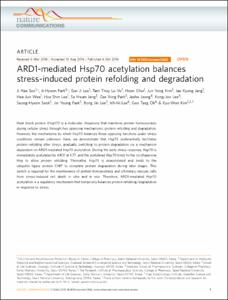ARD1-mediated HSP70 acetylation balances stress-induced protein refolding and degradation
- Keimyung Author(s)
- Seo, Ji Hye
- Department
- Dept. of Biochemistry (생화학)
- Journal Title
- Nature Communications
- Issued Date
- 2016
- Volume
- 7
- Abstract
- Heat shock protein (Hsp)70 is a molecular chaperone that maintains protein homoeostasis during cellular stress through two opposing mechanisms: protein refolding and degradation. However, the mechanisms by which Hsp70 balances these opposing functions under stress conditions remain unknown. Here, we demonstrate that Hsp70 preferentially facilitates protein refolding after stress, gradually switching to protein degradation via a mechanism dependent on ARD1-mediated Hsp70 acetylation. During the early stress response, Hsp70 is immediately acetylated by ARD1 at K77, and the acetylated Hsp70 binds to the co-chaperone Hop to allow protein refolding. Thereafter, Hsp70 is deacetylated and binds to the ubiquitin ligase protein CHIP to complete protein degradation during later stages. This switch is required for the maintenance of protein homoeostasis and ultimately rescues cells from stress-induced cell death in vitro and in vivo. Therefore, ARD1-mediated Hsp70 acetylation is a regulatory mechanism that temporally balances protein refolding/degradation in response to stress.
- Keimyung Author(s)(Kor)
- 서지혜
- Publisher
- School of Medicine (의과대학)
- Citation
- Jaeho Jeong et al. (2016). ARD1-mediated HSP70 acetylation balances stress-induced protein refolding and degradation. Nature Communications, 7, 12882–12882. doi: 10.1038/ncomms12882
- Type
- Article
- ISSN
- 2041-1723
- Appears in Collections:
- 1. School of Medicine (의과대학) > Dept. of Biochemistry (생화학)
- 파일 목록
-
-
Download
 oak-2018-0123.pdf
기타 데이터 / 2.1 MB / Adobe PDF
oak-2018-0123.pdf
기타 데이터 / 2.1 MB / Adobe PDF
-
Items in Repository are protected by copyright, with all rights reserved, unless otherwise indicated.